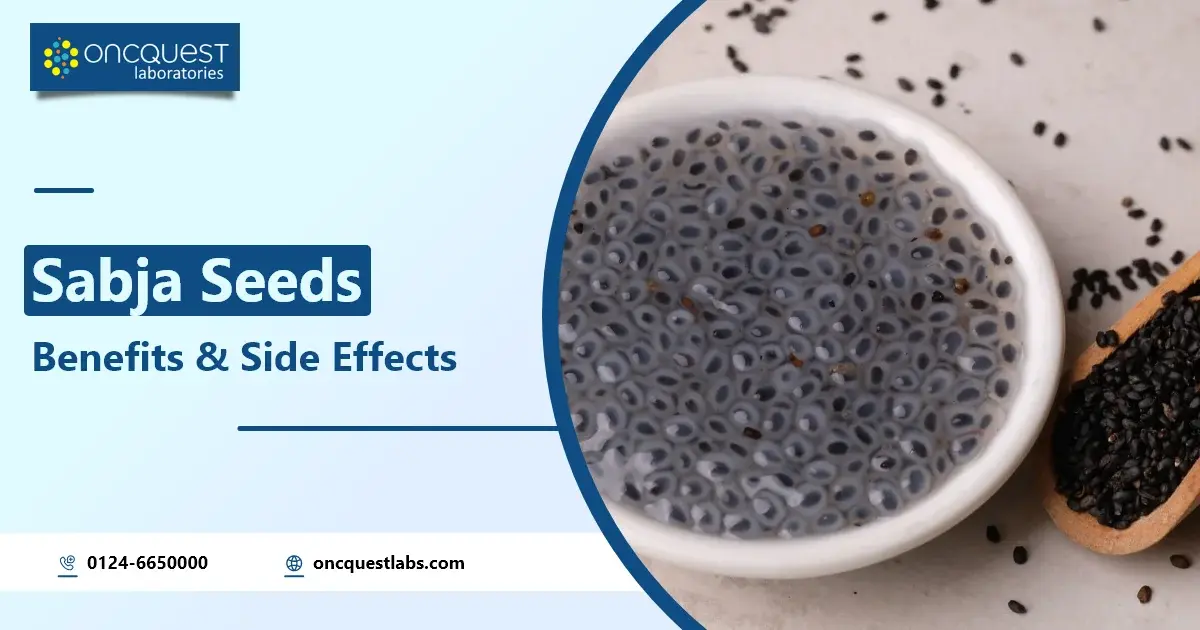Sabja seeds, also known as Basil seeds or Tukmaria, have gained popularity worldwide for their nutritional benefits and culinary versatility. These tiny black seeds, derived from the sweet basil plant (Ocimum basilicum), have been used for centuries in Ayurvedic and traditional medicine practices across Asia. They are often compared to chia seeds due to their similar appearance and nutrient profile but offer unique health benefits of their own.
Sabja seeds are rich in essential nutrients such as fiber, protein, vitamins, and minerals, making them a valuable addition to a balanced diet. They are particularly prized for their digestive benefits, aiding in relieving constipation and bloating due to their high fiber content. Additionally, Sabja seeds are known for their cooling properties, traditionally used in beverages like falooda and sherbet to beat the heat during hot summers.
Beyond digestive health, Sabja seeds may contribute to weight management by promoting a feeling of fullness and potentially reducing food cravings. They also offer antioxidant properties, which help combat oxidative stress and support overall health.
Contents
- 1 Nutritional Value of Sabja Seeds
- 2 Sabja Seeds Benefits
- 2.1 Rich in Nutrients
- 2.2 Digestive Aid
- 2.3 Weight Management
- 2.4 Cooling Properties
- 2.5 Hydration Suppor
- 2.6 Antioxidant Benefits
- 2.7 Blood Sugar Regulation
- 2.8 Heart Health
- 2.9 Bone Health
- 2.10 Skin Health
- 2.11 Anti-inflammatory Properties
- 2.12 Stress Relief
- 2.13 Respiratory Health
- 2.14 Detoxification
- 2.15 Hormonal Balance
- 2.16 Anti-microbial Activity
- 3 Sabja Seeds Side Effects
- 4 Conclusion:
- 5 FAQ:
Nutritional Value of Sabja Seeds
Here’s a table outlining the nutritional value of Sabja seeds (per 1 tablespoon, approximately 11 grams):
| Nutrient | Amount per 1 tbsp (11g) |
| Calories | 42 |
| Protein | 1.6 grams |
| Fat | 3.4 grams |
| Carbohydrates | 5.7 grams |
| Dietary Fiber | 5.4 grams |
| Calcium | 277 mg |
| Iron | 1.3 mg |
| Magnesium | 56 mg |
| Phosphorus | 36 mg |
| Potassium | 88 mg |
This table provides an overview of the nutritional content found in Sabja seeds, highlighting their richness in fiber, essential minerals like calcium and magnesium, and moderate levels of protein and healthy fats. These nutrients contribute to the health benefits associated with Sabja seeds, including digestive health support, weight management aid, and overall nutritional supplementation.
Sabja Seeds Benefits
Sabja seeds, also known as Basil seeds or Tukmaria, offer a range of health benefits due to their nutrient content and medicinal properties. Here are 16 benefits of Sabja seeds explained in detail:
Rich in Nutrients
Sabja seeds, also known as Basil seeds or Tukmaria, are nutrition powerhouses packed with essential nutrients. They boast a rich profile that includes fiber, protein, vitamins (A, K, C), and minerals such as calcium, magnesium, and iron. These seeds are particularly valued for their dietary fiber content, which supports digestive health by promoting regular bowel movements and relieving constipation. Additionally, their impressive array of vitamins and minerals contributes to overall well-being, making them a valuable addition to a balanced diet aimed at enhancing nutritional intake and supporting various bodily functions.
Digestive Aid
Sabja seeds are renowned for their ability to aid digestion. Rich in dietary fiber, they promote gastrointestinal health by supporting regular bowel movements and relieving constipation. When soaked in water, these seeds form a gel-like consistency that helps soften stool and facilitate smoother digestion. This fiber-rich property not only enhances digestive regularity but also promotes a feeling of fullness, which can aid in appetite control and weight management. Moreover, Sabja seeds’ gentle action on the digestive system makes them a natural and effective remedy for improving overall digestive comfort and health. Integrating Sabja seeds into your diet can contribute to a more balanced and efficient digestive process.
Weight Management
Sabja seeds offer potential benefits for weight management due to their unique properties. When exposed to water, these seeds swell up and form a gel-like substance, which can promote a feeling of fullness. This can help curb appetite and reduce overall food intake, supporting efforts to manage calorie consumption. Additionally, the fiber content in Sabja seeds aids in digestion and promotes bowel regularity, which can contribute to a healthier digestive system and potentially aid in weight loss goals. By adding Sabja seeds to meals or beverages, individuals may experience enhanced satiety and improved portion control, making them a beneficial addition to a balanced diet aimed at weight management.
Cooling Properties
Sabja seeds are celebrated for their cooling properties, making them particularly valuable during hot weather or for individuals seeking relief from heat-related discomfort. When soaked in water, these tiny seeds develop a gel-like texture that imparts a cooling sensation upon consumption. This effect helps to regulate body temperature and alleviate heat stress. Traditionally used in beverages like falooda and sherbet, Sabja seeds not only enhance flavor but also provide a refreshing experience. Their cooling nature is believed to soothe the body internally, making them a popular choice in tropical climates or during periods of intense heat. Integrating Sabja seeds into drinks or desserts can be a simple and enjoyable way to harness their natural cooling benefits for overall comfort and well-being.
Hydration Suppor
Sabja seeds provide hydration support through their unique ability to absorb and retain water. When soaked in water, these seeds develop a gel-like coating around them, which helps in retaining moisture. This gel formation aids in maintaining hydration levels within the body, making Sabja seeds beneficial for promoting overall hydration. This property not only helps in preventing dehydration but also supports various bodily functions that rely on adequate water intake. Incorporating Sabja seeds into beverages or consuming them soaked in water can be an effective way to enhance hydration, especially during hot weather or periods of increased physical activity. This natural hydration support makes Sabja seeds a valuable addition to a balanced diet aimed at maintaining optimal hydration and overall health.
Antioxidant Benefits
Sabja seeds offer notable antioxidant benefits, contributing to overall health and well-being. Antioxidants are compounds that help neutralize harmful free radicals in the body, thereby protecting cells from oxidative stress and damage. Sabja seeds contain antioxidants such as flavonoids, polyphenols, and vitamins (like vitamin A and C), which play crucial roles in reducing inflammation, supporting immune function, and promoting skin health. By scavenging free radicals, these antioxidants help mitigate oxidative damage that can lead to chronic diseases such as cardiovascular disorders and certain cancers. Including Sabja seeds in your diet can thus bolster your body’s defense against oxidative stress and support long-term health outcomes.
Blood Sugar Regulation
Sabja seeds may play a role in regulating blood sugar levels, offering potential benefits for individuals managing diabetes or insulin resistance. The seeds contain soluble fiber, which can slow down the absorption of carbohydrates and sugars in the digestive tract. This helps in preventing rapid spikes in blood glucose levels after meals, promoting more stable and balanced blood sugar levels over time. Additionally, Sabja seeds’ gel-like consistency when hydrated may further contribute to their ability to moderate blood sugar response. While research in this area is ongoing, incorporating Sabja seeds into a balanced diet, alongside medical advice and regular monitoring, may offer support in managing blood sugar levels effectively.
Heart Health
Sabja seeds support heart health through their rich content of omega-3 fatty acids, which help reduce inflammation and improve blood vessel function. Their high fiber content aids in lowering LDL (bad) cholesterol levels by binding to cholesterol in the digestive tract, promoting cardiovascular health. Additionally, Sabja seeds are packed with antioxidants like flavonoids and polyphenols, which combat oxidative stress and protect blood vessels from damage. These seeds also provide potassium and magnesium, minerals that help regulate blood pressure, contributing to overall heart function and reducing the risk of cardiovascular diseases when incorporated into a balanced diet.
Bone Health
Sabja seeds contribute to bone health primarily through their rich calcium content. Calcium is essential for maintaining strong bones and teeth, and Sabja seeds provide a significant amount of this mineral per serving. Adequate calcium intake helps prevent conditions like osteoporosis, which is characterized by weakened bones and increased risk of fractures. Incorporating Sabja seeds into your diet can thus support bone density and overall skeletal health. Pairing them with other calcium-rich foods and ensuring a balanced intake of essential nutrients further enhances their benefits for bone strength and resilience.
Skin Health
Sabja seeds offer benefits for skin health due to their antioxidant properties and nutrient content. Antioxidants like vitamins A, C, and E found in Sabja seeds help protect skin cells from damage caused by free radicals, which can accelerate aging and lead to wrinkles and dullness. These antioxidants also support collagen production, essential for maintaining skin elasticity and firmness. Additionally, the hydrating properties of Sabja seeds, when consumed or applied topically, can help keep the skin moisturized and supple. Including Sabja seeds in your diet may thus contribute to healthier, more radiant skin, alongside a balanced skincare regimen and hydration routine.
Anti-inflammatory Properties
Sabja seeds possess notable anti-inflammatory properties, which contribute to their health benefits. Inflammation is linked to various chronic diseases and conditions, including cardiovascular diseases, arthritis, and metabolic disorders. The antioxidants and phytochemicals in Sabja seeds help combat inflammation by neutralizing free radicals and reducing oxidative stress in the body. This anti-inflammatory action not only supports overall health but also may alleviate symptoms of inflammatory conditions, promoting joint health and potentially reducing the risk of chronic diseases. Incorporating Sabja seeds into your diet as part of a balanced meal plan can complement efforts to maintain optimal health and well-being.
Stress Relief
Sabja seeds offer potential benefits for stress relief through their calming properties and nutritional content. While specific studies on Sabja seeds’ direct effects on stress are limited, their use in traditional medicine suggests they may help promote relaxation and reduce anxiety. The seeds contain nutrients like magnesium, which plays a role in regulating neurotransmitters and promoting relaxation. Additionally, the act of consuming Sabja seeds in beverages or meals can provide a soothing experience, contributing to overall stress reduction. As part of a balanced diet and healthy lifestyle, incorporating Sabja seeds may support mental well-being and contribute to managing stress effectively.
Respiratory Health
Sabja seeds are traditionally used in Ayurvedic practices to support respiratory health. Their mucilaginous properties, when soaked in water, create a gel-like substance that may help soothe respiratory discomforts such as coughs and asthma. Additionally, Sabja seeds contain antioxidants and anti-inflammatory compounds that can support lung function and alleviate inflammation in the respiratory tract. While more research is needed to confirm these benefits, incorporating Sabja seeds into your diet as part of a balanced regimen may contribute to respiratory health, especially when combined with other supportive measures like proper hydration and regular exercise.
Detoxification
Sabja seeds can aid in detoxification by promoting digestive health and supporting the body’s natural cleansing processes. The high fiber content in Sabja seeds helps regulate bowel movements, facilitating the elimination of toxins and waste products from the body. Additionally, their hydrating properties when soaked in water contribute to maintaining optimal hydration levels, which are essential for efficient detoxification. Sabja seeds’ antioxidant properties further enhance detox efforts by neutralizing free radicals and reducing oxidative stress. Incorporating Sabja seeds into a balanced diet can thus support overall detoxification, promoting gastrointestinal health and aiding the body in eliminating harmful substances effectively.
Hormonal Balance
Sabja seeds may contribute to hormonal balance, particularly in women, due to their phytoestrogen content. Phytoestrogens are plant-based compounds that mimic the activity of estrogen in the body, albeit milder. These compounds can help regulate estrogen levels, potentially alleviating symptoms of hormonal imbalance such as irregular menstrual cycles or menopausal symptoms. Additionally, the nutrients found in Sabja seeds, including vitamins and minerals like calcium and magnesium, support overall hormone production and function. While more research is needed to fully understand their effects on hormonal health, incorporating Sabja seeds into a balanced diet may offer natural support for maintaining hormonal balance in women.
Anti-microbial Activity
Sabja seeds exhibit antimicrobial properties that can help combat microbial infections in the body. These properties are attributed to compounds like flavonoids and polyphenols found in the seeds, which have been shown to possess antibacterial and antifungal properties. By inhibiting the growth of harmful bacteria and fungi, Sabja seeds may aid in preventing infections and promoting overall immune health. However, more research is needed to understand the full extent of their antimicrobial activity and how they can be effectively used as a natural antimicrobial agent. Incorporating Sabja seeds into your diet may provide supplementary support for maintaining a healthy immune system and combating microbial threats.
Incorporating Sabja seeds into your diet in various forms, such as soaking in water, added to smoothies, or sprinkling over salads and desserts, can help reap these health benefits. As with any supplement or food, moderation and individual tolerance should be considered, especially for those with specific health conditions or allergies.
Sabja Seeds Side Effects
Sabja seeds, like any natural supplement, may have potential side effects, especially if consumed in excess or by individuals with specific health conditions. Here are eight possible side effects to consider
Choking Hazard
Sabja seeds, when exposed to water, expand and form a gel-like coating. If not adequately soaked before consumption, these seeds can pose a choking hazard, especially for children or individuals with swallowing difficulties. The gel-like texture can adhere to the throat, making it difficult to swallow and potentially leading to choking incidents. To mitigate this risk, it’s crucial to soak Sabja seeds in water for at least 15 minutes before consumption, allowing them to fully hydrate and soften. This precaution ensures they are safe to ingest and minimizes the risk of choking or throat obstruction.
Digestive Issues
Sabja seeds, due to their high fiber content, may lead to digestive issues if not consumed properly. Fiber is essential for digestive health, but excessive intake without adequate hydration can cause discomfort such as bloating, gas, or constipation. The gel-like coating formed when Sabja seeds are soaked in water can also affect digestion if consumed in large quantities or without sufficient fluid intake. To prevent digestive issues, it’s recommended to soak Sabja seeds adequately before consumption and ensure adequate water intake throughout the day. Moderation and proper hydration are key to enjoying the digestive benefits of Sabja seeds without experiencing discomfort.
Allergic Reactions
Sabja seeds can trigger allergic reactions in individuals sensitive to seeds or basil. These reactions may manifest as itching, swelling, hives, or even respiratory symptoms like wheezing or difficulty breathing. Allergic responses vary in severity and can occur shortly after consuming Sabja seeds. Individuals with known allergies to seeds or basil should exercise caution when consuming Sabja seeds or products containing them. It’s advisable to start with a small amount to assess tolerance and seek medical advice if allergic symptoms occur. Avoiding Sabja seeds altogether is recommended for those with severe allergies to prevent potentially serious reactions.
Blood Sugar Levels
Sabja seeds may influence blood sugar levels, which is important for individuals managing diabetes or insulin resistance. While they are often considered beneficial for their potential to help regulate blood sugar, their effects can vary depending on individual metabolism and dietary context. Sabja seeds contain soluble fiber, which can slow down the absorption of sugars and carbohydrates in the digestive tract, potentially leading to more stable blood glucose levels after meals. However, people with diabetes should monitor their blood sugar closely when incorporating Sabja seeds into their diet, as they may interact with medications or other dietary factors affecting blood sugar control. Consulting with a healthcare provider is advisable to determine the best approach for incorporating Sabja seeds safely into a diabetes management plan.
Medication Interactions
Sabja seeds may interact with medications, particularly those for blood thinning and diabetes. The omega-3 fatty acids in Sabja seeds could potentially enhance the effects of blood-thinning medications like warfarin or aspirin, increasing the risk of bleeding. For individuals with diabetes, Sabja seeds’ soluble fiber may affect blood sugar levels, requiring careful monitoring and potential adjustment of diabetes medications. It’s essential to consult with a healthcare provider before incorporating Sabja seeds into your diet, especially if you are on prescription medications, to ensure safe management of your health conditions and avoid potential interactions.
Pregnancy and Breastfeeding
Pregnant and breastfeeding women should exercise caution when considering Sabja seeds. While they are generally considered safe in moderate amounts, there is limited research on their specific effects during pregnancy and lactation. Sabja seeds’ potential hormonal effects, due to their phytoestrogen content, may raise concerns about their impact on hormone-sensitive conditions. It’s advisable for pregnant and breastfeeding women to consult healthcare providers before incorporating Sabja seeds into their diet. This ensures informed decisions that prioritize maternal and fetal health while considering any potential risks or benefits associated with their consumption during these sensitive periods.
Hormonal Effects
Sabja seeds contain phytoestrogens, which are plant-based compounds that can mimic estrogen in the body, albeit less strongly than human estrogen. These phytoestrogens have the potential to interact with hormone levels, particularly estrogen, in both men and women. For women, this could potentially affect menstrual cycles or hormone-sensitive conditions. For men, it might influence testosterone levels. While Sabja seeds are generally safe for consumption in moderate amounts, individuals with hormone-related health concerns or conditions should exercise caution and consult with a healthcare provider before incorporating them into their diet. Monitoring any potential effects on hormonal balance is advisable for those with specific health considerations.
Conclusion:
Sabja seeds, also known as Basil seeds or Tukmaria, offer a myriad of health benefits ranging from digestive support to potential effects on heart health and beyond. Rich in fiber, antioxidants, and essential nutrients like calcium and omega-3 fatty acids, these seeds contribute to overall well-being when incorporated into a balanced diet. However, it’s essential to be mindful of potential side effects and interactions, especially for individuals with specific health conditions or allergies. Consulting with a healthcare provider before adding Sabja seeds to your regimen can ensure safe and effective use tailored to individual needs.
FAQ:
Are Sabja seeds safe to consume daily?
Sabja seeds are generally safe for most people when consumed in moderation. However, individuals with allergies to seeds or basil should avoid them.
How should Sabja seeds be consumed?
Sabja seeds can be soaked in water until they form a gel-like texture and then added to beverages, desserts, or meals. Start with small amounts to assess tolerance.
Do Sabja seeds help in weight loss?
Sabja seeds may aid in weight management by promoting a feeling of fullness and supporting digestion. They are often included in weight loss diets for their fiber content.
Can Sabja seeds regulate blood sugar levels?
Due to their soluble fiber content, Sabja seeds may help regulate blood sugar levels by slowing down carbohydrate absorption. Monitor blood sugar closely if using them alongside diabetes medications.
Are there any side effects of Sabja seeds?
Potential side effects include digestive issues like bloating, allergic reactions, and interactions with medications. Always consume Sabja seeds with adequate hydration and consult a healthcare provider if you experience adverse effects.





